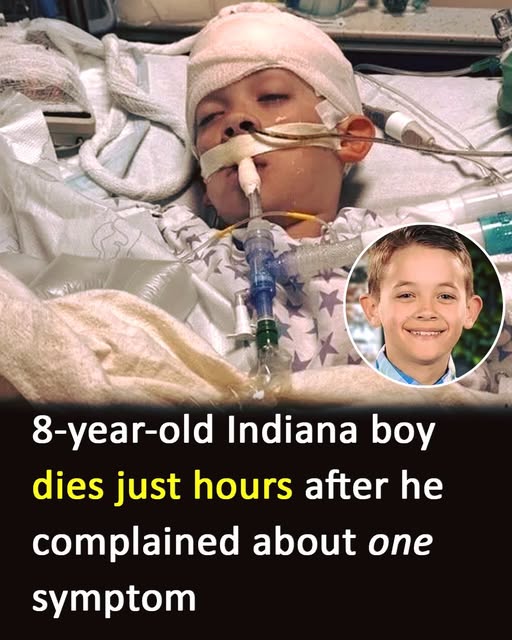When Ashlee Dahlberg’s 8-year-old son, Liam, came home from school one day with just a mild headache, she never imagined it would be the last night she would ever spend with him. What seemed like a common childhood complaint quickly turned into a life-altering nightmare no parent should ever have to endure.
By the following morning, Liam’s condition had deteriorated drastically. He was barely responsive, prompting the Indiana family to rush him to the hospital in a state of panic and confusion. What the doctors discovered was nothing short of devastating—Liam’s brain and spinal cord were overwhelmed by an aggressive bacterial infection. The culprit: Haemophilus influenzae type b, more commonly known as Hib.

Though the name might suggest a connection to the flu, Hib is a completely different illness. It can begin as a seemingly mild upper respiratory infection but has the potential to evolve into much more severe conditions like meningitis and sepsis. In Liam’s tragic case, the infection escalated rapidly, turning into a deadly case of meningitis overnight.
Doctors moved quickly, performing an MRI and running tests, but the results were grim. “They discovered how much bacteria had already taken over his brain and spinal cord,” Ashlee told WHTR, her voice still shaking from the trauma. “At that point, there was nothing they could do.”
Liam was already vaccinated against Hib, but doctors suspect he may have caught the infection from someone who wasn’t—a growing risk in the United States as more parents delay or forgo vaccinations entirely. Ashlee shared that the medical team was stunned by the speed and severity of the infection. “Anybody that contracts it usually dies within 24 hours,” she said. “It moved so fast.”
Despite having done everything by the book—getting Liam vaccinated, monitoring his health, seeking immediate care—Ashlee was forced to watch her child slip away. “I would never wish this kind of pain on my worst enemy,” she said. “To sit there and hear the doctor say, ‘You did everything right, but there was nothing we could do,’ and then to hold him as they turned off the machines—feeling his little heartbeat fade away—it was unbearable.”
That grief has now become Ashlee’s driving force. She’s turning her heartbreak into a mission to prevent other families from experiencing the same loss. Her message to other parents is clear and urgent: make sure your children are fully vaccinated. “There’s no pain like this,” she said. “I feel like I failed my child because I couldn’t protect him from everything, even though I tried.”
Dr. Eric Yancy, a pediatrician, echoed Ashlee’s concerns. He recalled the devastation caused by Hib before the vaccine became widely available in 1985. “If the infection didn’t kill the child quickly, it often left them with lasting complications—hearing loss, brain damage, or developmental delays,” Dr. Yancy explained. “The vaccine changed everything.”
The Hib vaccine is around 95% effective. But like many vaccines, it relies on community immunity to be most effective. That means when large numbers of people choose not to vaccinate, they increase the risk of spreading the disease to others, even those who are protected.
Liam’s family has launched a GoFundMe campaign to help with medical expenses and to keep his memory alive. The campaign describes Liam as a bright, curious boy who was “full of life and potential,” and whose “presence brought joy and warmth to everyone he met.” Over $54,000 has already been raised as friends, neighbors, and strangers come together to support the Dahlbergs in their time of loss.
Ashlee also shared a deeply emotional video showing Liam in the hospital. His small body writhed in pain as the infection ravaged him. The footage is heartbreaking but serves as a sobering reminder of how vicious Hib can be—and how fast it can take hold. “He was kind and sweet,” the family wrote on the fundraising page. “He touched the hearts of everyone around him.”
Despite its severity, Hib often doesn’t get the attention it deserves, partly because of the cost associated with the vaccine. Hib vaccines are significantly more expensive than many other common childhood vaccines—costing nearly seven times more than the combined cost of immunizations for measles, polio, tuberculosis, diphtheria, tetanus, and pertussis.
The World Health Organization recommends a pentavalent vaccine that protects against five serious diseases, including Hib. In high-income countries, 92% of children are vaccinated against Hib. Europe’s rate stands at 94%, while the global average is 77%. In the Western Pacific region, however, the number drops dramatically to just 33%, in part due to the cost and limited access.
As vaccine hesitancy continues to rise and immunization rates drop, Liam’s story is a painful but necessary reminder of what’s truly at stake. Choosing not to vaccinate isn’t just a personal decision—it’s one that can have deadly consequences for others, including those who have done everything right.
For Ashlee, the days since Liam’s passing have been filled with grief, but also with purpose. She is speaking out in the hopes of saving lives. “Please, vaccinate your children,” she pleads. “I don’t want any other parent to go through this pain.”
Liam’s story is not just a tragedy—it’s a call to action. It’s a reminder that infectious diseases still pose a serious threat, especially when we lower our defenses. Vaccines are one of the most powerful tools we have to protect our children. Let’s not wait for another innocent life to be lost before we take them seriously.





